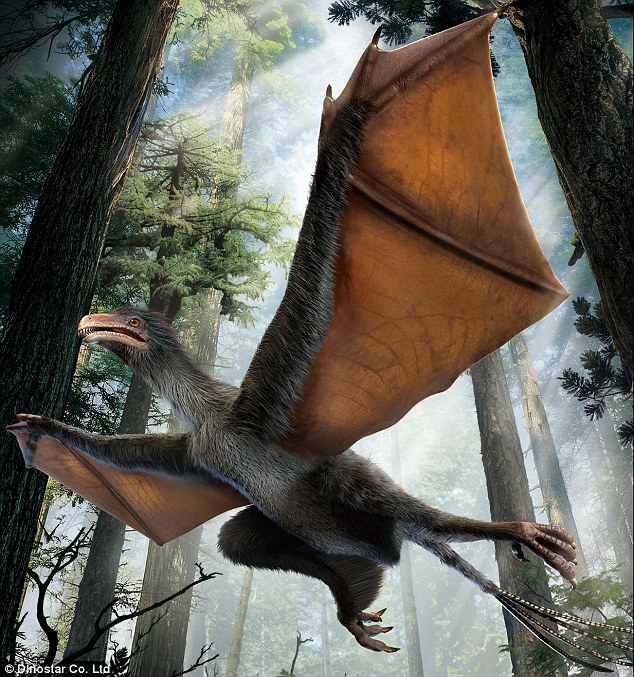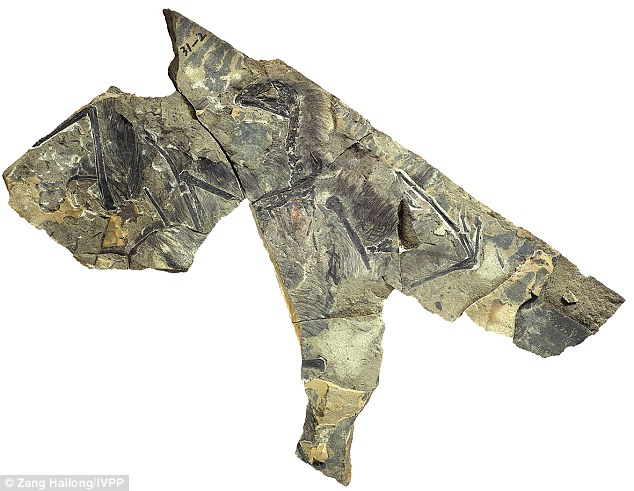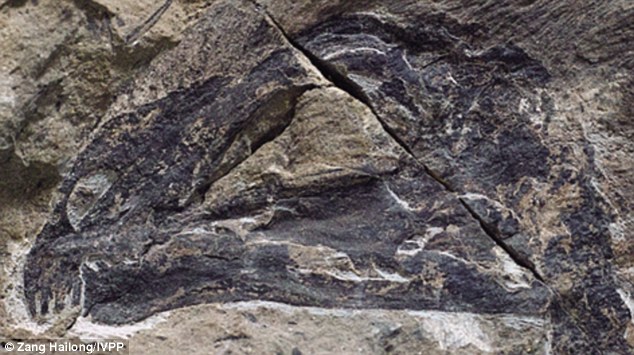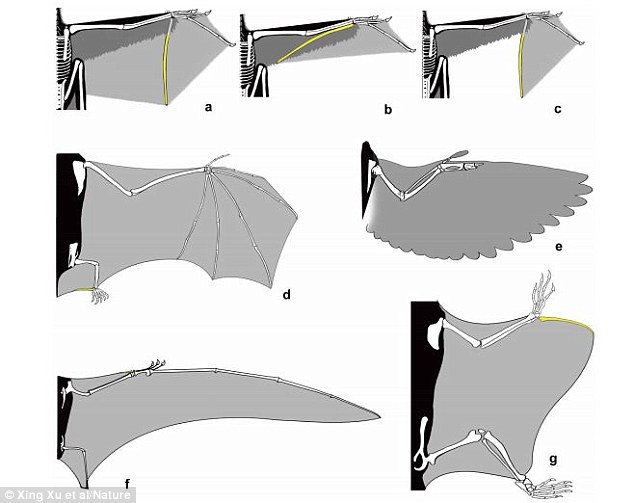fossilshk
(Lung)
管理員
  








UID 1
精華
23
積分 4775
帖子 2827
閱讀權限 200
註冊 2006-7-14
來自 中國/香港
狀態 離線
|
[廣告]:
Dinosaur with wings like a BAT found in China
Weird 'dinobat' discovered in China: Dinosaur with wings like a BAT may reveal clues about the origin of flight
-Yi qi is thought to have lived 160 million years ago during the late Jurassic
-The dinosaur has an unusual bone sticking out of its wrist and had a membrane that covered it to form a wing much like that of a modern bat
-Scientists say it is unlike any other dinosaur, which evolved into birds, and may have glided or even been able to fly by flapping over short distances
-The fossil was discovered by a farmer in Qinglong County in north China
A bizarre new dinosaur with bat-like wings has been discovered by a farmer in China and is now helping to shed new light on the evolution of flight.
Palaeontologists in China say the impeccably preserved fossil belongs to a small dinosaur thought to have lived 160 million years ago.
The strange-looking creature had small stiff feathers on its body and long finger-like bones extending from each wrist that were covered in a membrane like a bat’s wing.

The new dinosaur, named Yi qi (shown above in the artists reconstruction), had unusual bristle-like feathers and bat-like wings that were covered in a membrane. The dinosaur may have been able to glide and even flap
Scientists believe the dinosaur, which they have named Yi qi, meaning ‘strange wing’, may have glided or even flown through the air.The discovery has provided new insight into how vertebrates first began to take to the air.
Researchers say the dinosaur, which would have weighted just 13 ounces (380g), may have been an early evolutionary experiment with flight.
Yi qi belongs the group of carnivorous dinosaurs known as the therapods - which includes Tyranosaurus rex and velociraptor.
These dinosaurs are thought to have been the ancestors of modern birds.
But unlike modern birds, Yi qi was found to have a strange extra bone extending backwards from its wrist, rather like an entirely separate group of animals that learned to fly - the bats.
Professor Xing Xu, one of the world’s leading prolific palaeontologists at the Chinese Academy of Sciences in Beijing and who led the work, said: 'This is really something for me. It is the most unexpected discovery I ever made.
'Birds are descended from dinosaurs, but how exactly the transition occurred is not really clear. This new discovery is a new species of these bird like dinosaurs.
'This dinosaur is totally different. It has totally different wings from all other birds and their close relatives.
'Close to the origin of birds there are many lineages trying to get into the air but there was only one group that succeeded.
'I would have said this example shows how much experimentation close to this transition.'
The discovery comes in the same week as researchers announced the discovery of a bizarre vegetarian relative of the T-Rex.
The Yi qi fossil was discovered by a local farmer in Mutoudeng, in Qinglong County, Hebei Province in China.
The fossil has preserved stiff filamentous features on the forelimb and hindlimb, along with patches of the membrane that once stretched across its wings.
However, it was the strange wrists and long rod-like bones that extended from them that baffled the attention of the palaeontologists.
There are three main groups of flying vertebrates - the birds, which evolved from dinosaurs, pterosaurs that were flying reptiles that existed alongside the dinosarus, and the bats, which are mammals that evolved after the extinction of the dinosaurs 66 million years ago.
Most winged avian dinosaurs to be discovered so far all have wing structures that are similar to those of modern birds.
However, Yi qi, which is pronounced 'ee chee', appears to be a weird hybrid between a dinosaur and a bat.
This suggests that at the time several different types of winged dinosaurs evolved wings in an attempt to fly.

The fossil of Yi qi (above) was so well preserved that bristle-like feathers and the remains of its membrane wings could be seen around the bones. The strange long bone extending from the wrist was highly unusual

This close up of the skull of Yi qi, which weighed just 13 ounces (380g), show oval like feathers near the head
Analysis by Professor Xu and his colleagues, which is published in the journal Nature, suggest that it is likely the dinosaur glided, perhaps like modern flying squirrels.
The dinosaur lacked the strong muscle attachments to the forelimb bones and its bone structure would have interfered with the flapping and rotating movements needed during powered flight.
Instead it may have launched itself from elevated perches and glided to the ground. If it did flap its wings it would probably have only been able to fly over short distances.
But Professor Xu said: 'We thought giving this animal a name meaning "strange wing" was appropriate, because no other bird or dinosaur has a wing of the same kind
'We don’t know if Yi qi was flapping, or gliding, or both, but it definitely evolved a wing that is unique in the context of the transition from dinosaurs to birds.'
It is likely that the conclusions will be controversial with other evolutionary biologists, but it could prove hugely valuable in unravelling how birds evolved from their dinosaur ancestors.
Professor Zheng Xiaoting, from Linyi University in Shandong who also took part in the study, said: 'Yi qi lived in the Jurassic, so it was a pioneer in the evolution of flight on the line to birds.
'It reminds us that the early history of flight was full of innovations, not all of which survived.'
Dr Kevin Padian, a palaeontologist at the University of California Berkeley, warned that the animal may not have been able to fly at all.

The diagrams above show how the wing of Yi qi (a) compares to other winged tetrapods (b and c) and the wing of a bat (d), the wing of a pigeon (e), the wing of a pterosaur (f) and the wing of a Japanese flying squirrel (g)
He said: ‘As for gliding, if Yi qi’s styliform element helped to support a membranous aerofoil, it can be used to reconstruct the planform of the wing, as Xu and colleagues have done.
‘But in a gliding animal, the centre of lift of the aerofoil should be fairly congruent with the centre of gravity of the body — if the bulk of the animal’s weight falls too far behind the centre of lift, the back end will sag and the animal will stall.
‘That is clearly the case in the authors’ reconstruction of Yi qi, but an aerofoil that was swept back more, if anatomically possible, might have mitigated this problem.
‘Still, we are left in a quandary: an animal with a strange structure that looks as if it could have been used in flight, borne by an animal that otherwise shows no such tendencies.
‘And so far, there is no other plausible explanation for the function of this structure.’
Read more:
http://www.nature.com/nature/jou ... ll/nature14423.html
| 
 |
|



